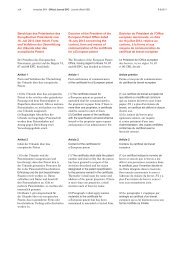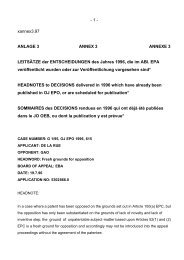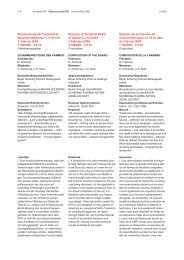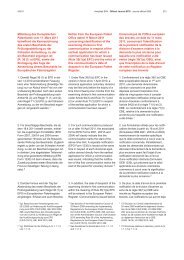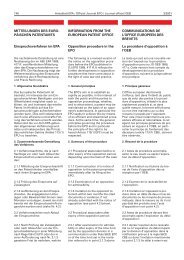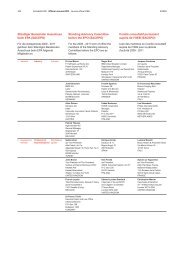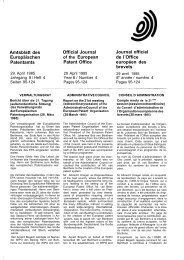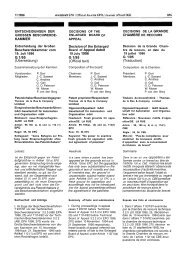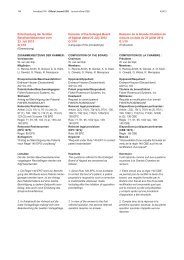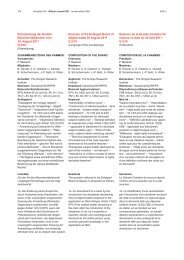Sonderausgabe 1 - European Patent Office
Sonderausgabe 1 - European Patent Office
Sonderausgabe 1 - European Patent Office
Create successful ePaper yourself
Turn your PDF publications into a flip-book with our unique Google optimized e-Paper software.
2007 <strong>Sonderausgabe</strong> Nr. 1 ABl. EPA / Special edition No. 1 OJ EPO / Edition spéciale n° 1 JO OEB 105<br />
(3) In der Beweisaufnahme können sich<br />
die zu vernehmenden Beteiligten,<br />
Zeugen oder Sachverständigen, die sich<br />
in einer Amtssprache des Europäischen<br />
<strong>Patent</strong>amts oder eines Vertragsstaats<br />
nicht hinlänglich ausdrücken können,<br />
einer anderen Sprache bedienen. Erfolgt<br />
die Beweisaufnahme auf Antrag eines<br />
Beteiligten, so werden die Beteiligten,<br />
Zeugen oder Sachverständigen mit<br />
Erklärungen, die sie in einer anderen<br />
Sprache als in einer Amtssprache des<br />
Europäischen <strong>Patent</strong>amts abgeben, nur<br />
gehört, sofern dieser Beteiligte selbst für<br />
die Übersetzung in die Verfahrenssprache<br />
sorgt. Das Europäische<br />
<strong>Patent</strong>amt kann jedoch die Übersetzung<br />
in eine seiner anderen Amtssprachen<br />
zulassen.<br />
(4) Mit Einverständnis aller Beteiligten<br />
und des Europäischen <strong>Patent</strong>amts kann<br />
jede Sprache verwendet werden.<br />
(5) Das Europäische <strong>Patent</strong>amt übernimmt,<br />
soweit erforderlich, auf seine<br />
Kosten die Übersetzung in die Verfahrenssprache<br />
und gegebenenfalls in<br />
seine anderen Amtssprachen, sofern ein<br />
Beteiligter nicht selbst für die Übersetzung<br />
zu sorgen hat.<br />
(6) Erklärungen von Bediensteten des<br />
Europäischen <strong>Patent</strong>amts, Beteiligten,<br />
Zeugen und Sachverständigen, die in<br />
einer Amtssprache des Europäischen<br />
<strong>Patent</strong>amts abgegeben werden, werden<br />
in dieser Sprache in die Niederschrift<br />
aufgenommen. Erklärungen in einer<br />
anderen Sprache werden in der Amtssprache<br />
aufgenommen, in die sie übersetzt<br />
worden sind. Änderungen einer<br />
europäischen <strong>Patent</strong>anmeldung oder<br />
eines europäischen <strong>Patent</strong>s werden in<br />
der Verfahrenssprache in die Niederschrift<br />
aufgenommen.<br />
Regel 5<br />
Beglaubigung von Übersetzungen<br />
Ist die Übersetzung eines Schriftstücks<br />
erforderlich, so kann das Europäische<br />
<strong>Patent</strong>amt innerhalb einer zu bestimmenden<br />
Frist die Einreichung einer<br />
Beglaubigung darüber verlangen, dass<br />
die Übersetzung mit dem Urtext übereinstimmt.<br />
Wird die Beglaubigung nicht<br />
rechtzeitig eingereicht, so gilt das Schriftstück<br />
als nicht eingereicht, sofern nichts<br />
anderes bestimmt ist.<br />
(3) Where evidence is taken, any party,<br />
witness or expert to be heard who is<br />
unable to express himself adequately in<br />
an official language of the <strong>European</strong><br />
<strong>Patent</strong> <strong>Office</strong> or of a Contracting State<br />
may use another language. Where<br />
evidence is taken upon request of a<br />
party, parties, witnesses or experts<br />
expressing themselves in a language<br />
other than an official language of the<br />
<strong>European</strong> <strong>Patent</strong> <strong>Office</strong> shall be heard<br />
only if that party provides for interpretation<br />
into the language of the proceedings.<br />
The <strong>European</strong> <strong>Patent</strong> <strong>Office</strong> may,<br />
however, permit interpretation into one of<br />
its other official languages.<br />
(4) If the parties and the <strong>European</strong><br />
<strong>Patent</strong> <strong>Office</strong> agree, any language may<br />
be used.<br />
(5) The <strong>European</strong> <strong>Patent</strong> <strong>Office</strong> shall, if<br />
necessary, provide at its own expense<br />
interpretation into the language of the<br />
proceedings, or, where appropriate, into<br />
its other official languages, unless such<br />
interpretation is the responsibility of one<br />
of the parties.<br />
(6) Statements by employees of the<br />
<strong>European</strong> <strong>Patent</strong> <strong>Office</strong>, parties,<br />
witnesses or experts, made in an official<br />
language of the <strong>European</strong> <strong>Patent</strong> <strong>Office</strong>,<br />
shall be entered in the minutes in that<br />
language. Statements made in any other<br />
language shall be entered in the official<br />
language into which they are translated.<br />
Amendments to a <strong>European</strong> patent<br />
application or <strong>European</strong> patent shall be<br />
entered in the minutes in the language of<br />
the proceedings.<br />
Rule 5<br />
Certification of translations<br />
Where the translation of a document is<br />
required, the <strong>European</strong> <strong>Patent</strong> <strong>Office</strong><br />
may require that a certificate that the<br />
translation corresponds to the original<br />
text be filed within a period to be specified.<br />
If the certificate is not filed in due<br />
time, such document shall be deemed<br />
not to have been filed, unless otherwise<br />
provided.<br />
(3) Lors de l’instruction, les parties,<br />
témoins ou experts appelés à être<br />
entendus, qui ne possèdent pas une<br />
maîtrise suffisante d’une langue officielle<br />
de l’<strong>Office</strong> européen des brevets ou d’un<br />
Etat contractant, peuvent utiliser une<br />
autre langue. Si la mesure d’instruction<br />
est ordonnée sur requête d’une partie,<br />
les parties, témoins ou experts qui<br />
s’expriment dans une langue autre<br />
qu’une langue officielle de l’<strong>Office</strong> européen<br />
des brevets ne sont entendus que<br />
si cette partie assure l’interprétation<br />
dans la langue de la procédure. L’<strong>Office</strong><br />
européen des brevets peut toutefois<br />
autoriser l’interprétation dans l’une de<br />
ses autres langues officielles.<br />
(4) Sous réserve de l’accord des parties<br />
et de l’<strong>Office</strong> européen des brevets,<br />
toute langue peut être utilisée.<br />
(5) L’<strong>Office</strong> européen des brevets assure<br />
à ses frais, en tant que de besoin, l’interprétation<br />
dans la langue de la procédure,<br />
ou, le cas échéant, dans ses autres<br />
langues officielles, à moins que cette<br />
interprétation ne doive être assurée par<br />
l’une des parties.<br />
(6) Les interventions des agents de<br />
l’<strong>Office</strong> européen des brevets, des<br />
parties, témoins et experts faites dans<br />
une langue officielle de l’<strong>Office</strong> européen<br />
des brevets sont consignées au procèsverbal<br />
dans cette langue. Les interventions<br />
faites dans une autre langue sont<br />
consignées dans la langue officielle<br />
dans laquelle elles sont traduites. Les<br />
modifications apportées à une demande<br />
de brevet européen ou à un brevet européen<br />
sont consignées au procèsverbal<br />
dans la langue de la procédure.<br />
Règle 5<br />
Certification de traductions<br />
Lorsque la traduction d’un document est<br />
requise, l’<strong>Office</strong> européen des brevets<br />
peut exiger la production, dans un délai<br />
qu’il impartit, d’une attestation certifiant<br />
que la traduction est conforme au texte<br />
original. Si l’attestation n’est pas produite<br />
dans les délais, le document est réputé<br />
n’avoir pas été produit, sauf s’il en est<br />
disposé autrement.



